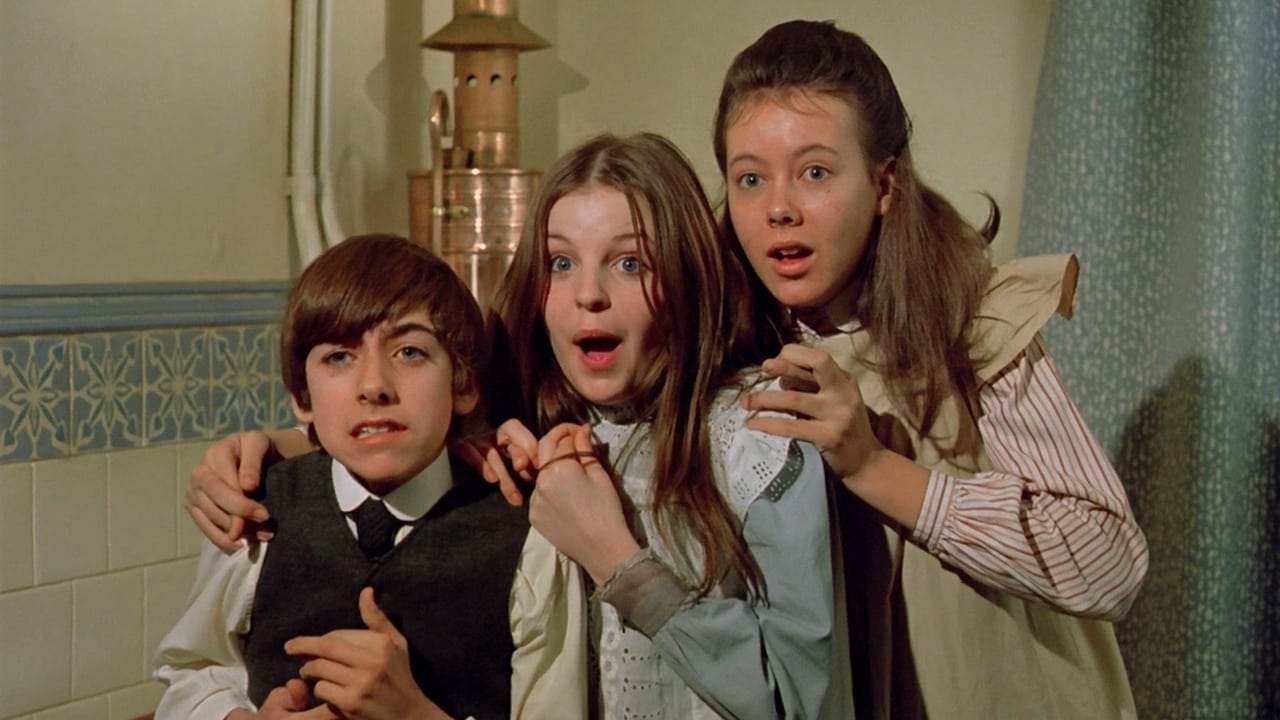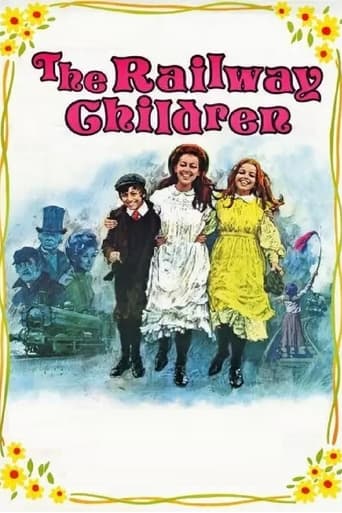

Based on the book by Edith Nesbit & the directorial debut of Lionel Jeffries, "The Railway Children" is a movie of immense charm. After the arrest & imprisonment of their father on charges of spying, a middle-class mother, (played by Dinah Sheridan), & her three children are forced to move to humbler surroundings. The Waterbury family move to a cottage in the Yorkshire Dales close to a railway which the three children Bobbie (Jenny Agutter), Phyllis (Sally Thomsett) & Peter (Gary Warren) frequently visit most days. They befriend the local station porter Mr. Perks (Bernard Cribbins) & an "old gentleman" passenger (William Mervyn). The latter helps to secure the eventual release of the children's father from his incarceration. Towards the films end when the father (Iain Cuthbertson) travels to Yorkshire to be re-united with his family, we witness what is probably the most moving "tear-jerking" scene in movie history. His eldest daughter Bobbie awaits at the station uncertain as to what is about to happen. Her father alights from a train in thick smoke from the steam engine. As the smoke clears & Bobbie slowly realises who it is standing on the platform she runs toward him & shouts "Daddy, my daddy". I must have seen this scene 20 times & it still brings moisture to my eyes. Jenny Agutter many years later narrated a documentary on the Keighley & Worth Valley Railway at Howarth in Yorkshire where the movie's railway scenes were filmed. We learnt from the people in charge of its preservation that this movie was the single biggest shot in the arm for tourism that it has ever had in its short history!.
... View MoreThe Railway Children, at least this 1970 movie version written and directed by that long-time British character actor, Lionel Jeffries, is an unmitigated...classic. It tells a childhood story with great simplicity and charm; the sentimentality is muted; the evocation of childhood adventures is involving; and Jeffries brings cleverness and style to his production. The Waterbury family is leading an idyllic life in Edwardian London. The father is prosperous, the mother is beautiful and loving, the children are well-mannered and affectionate, their home is warm and cozy. Then one night during the Christmas holidays two men appear at the doorstep, talk quietly to the father, and then take him away. In a moment the lives of Mrs Waterbury (Dinah Sheridan) and Bobbie, 14 (Jenny Agutter), Phyllis, 12 (Sally Thomsett) and young Peter (Gary Warren), have been changed. Only their fortitude and good spirits are going to see them through. Now teetering into poverty, Mrs. Waterbury takes her children to live in a musty old brick house in the countryside near a rail-line, not too far from a small village with a train station. The children discover the rail and regularly sit on a small hill to wave at the passengers as the train chugs by. One day an old gentleman, going to his business in the city, looks up from his newspaper and finds himself waving back. It's not long before he will play an important part in the story. As time passes, Mrs. Waterbury brings all her love and intelligence to bear on her children. She begins to write stories to earn money. She teaches them their lessons and provides a home of warmth and security for them. The story, however, is about these three children, especially Bobbie. At 14, she is old enough to want to share her mother's worries, yet young enough to enjoy the adventures she has with her sister and brother. They find a poor man at the station who cannot speak English. They discover he is a Russian refugee who no longer knows where his wife and child are. They insist he must come home with them, and their mother takes him in. Before long the children have written a large sign to the old gentlemen on the train asking for his help. They help a young man taking part in a steeplechase who breaks his leg in a train tunnel. Soon, he is at their home recuperating. They decide to have a birthday party for the station master, a man with few friends and several children who is a stickler for his dignity. It's not long before the children help him realize the difference between friendship and charity. In other words, the three children encounter all sorts of problems in their childhood adventures, and manage to be instrumental in seeing that all the problems have happy endings. But what of their own problems? Bobbie finally learns from her mother that her father was taken away because he had been accused of treason, of giving state secrets to the Russians. Will Bobbie be able to find a way to help? Will the old gentleman be something more than simply an old gentleman on a passing train? Will their father's case be reopened? Will there be a happy ending? Jenny Agutter was almost 18 when she filmed her part; she plays the 14-year-old Bobbie with great naturalness and charm. As important as the other players are, especially Dinah Sheridan as the mother, Agutter is the heart of the story. For me, it is Jenny Agutter's talent and Lionel Jeffries' style and restraint that make this movie so memorable. The story's problems come with no serious doubt but that they will be solved. And Jeffries does not just give us an expertly adapted and directed movie, he adds touches that are barely noticed but which charm us. This might include just a split second of a freeze frame as two people talk; or a slow close-up of a small, yellow wildflower in the grass outside Bobbie's home, then a slow pull-back from a yellow oil lamp being turned up inside; or the realization that a delightful interior shot or a view of the green countryside or a look at the train station from a hill...all suddenly recall those charming Edwardian hand-tinted drawings of a perfect by- gone time. Perhaps this gentle story can't compete for the time kids need nowadays to perfect their Nintendo monster-splatting skills. I'm almost positive it would never capture the attention of most of their parents, especially those weaned on Batman and Leone. Still, it's a perfectly put together movie and shouldn't be forgotten. As an aside, 19 years later the story was retold as a television program. This time, Jenny Agutter played the mother.
... View MoreI will admit I possibly missed tiny moments when I wasn't paying proper attention, but I got enough of the story to agree that it is a great family film, from director Lionel Jefferies, who played Grandpa Potts in Chitty Chitty Bang Bang. Basically it starts with a happy upper-middle class family living in Victorian London. One night the Father (Iain Cuthbertson) is visited by two strangers, and he leaves with them, and does not return. They move to a cottage in the country, and here the children; Bobbie (Jenny Agutter, who I first saw in Child's Play 2), Phyllis (Sally Thomsett) and Peter (Gary Warren) keep their spirits up, with their fascination for the nearby railroad. Everyday they wave faithfully to the passengers in the passing trains, and with courage and vigilance they also avoid an accident and are made heroes. Their kindness makes them friends, including important people who can help find the mystery of their missing father. Also starring Dinah Sheridan as Mother/Mrs. Waterbury, Bernard Cribbins as Albert Perks, William Mervyn as Old Gentleman, Peter Bromilow as Doctor Forrest, Ann Lancaster as Ruth and Gordon Whiting as Russian. It was number 29 on The 100 Greatest Family Films, and it was number 24 on The 50 Greatest British Films. Very good!
... View MoreThis is a film that I love above all others. I try to revisit the main film locations in Oakworth and Oxenhope whenever I can, which help to re-establish those magical qualities that this film seems to embody so uniquely - recalling a gentler and more mannered age, with its unspoken assertions that people really do matter, that family life is not just another disposable, and that life really is worth living (though sometimes, we may doubt that). In short, a film that soon brings tears to my eyes, helped perhaps by the deeply evocative music - some tunes are jaunty (like the Perks' tune, played on a trombone, sometimes with spoons), the stirring melody when the family first set off for Yorkshire not knowing what lies ahead, and the haunting little tune played on a solo clarinet (or is it an oboe?) that precedes sudden child-felt changes in fortune.This is as much a film for adults as for children, appealing to the eternal child in us all - a key that effortlessly reactivates those deep and apparently long-lost values and feelings buried inside us, which are normally swept aside by the demands of modern everyday life. This is a film about basic human goodness and decency in which we the viewers are left to make of it what we will, and there are welcome touches of humour sometimes added for good measure, such as the arrival of the aunt or, on a more earthy level, the bedroom scene on Perks' birthday - "All right Bert - as it's your birthday!" I must know every scene, every line of this film, and yet so great is the magic that each time I watch, it is like I am opening a box of delights for the first time, savouring each moment - sometimes humorous, sometimes....well, very different. As Peter says in the film: "it's perfect - more perfect than you know". And so it is!!!
... View More